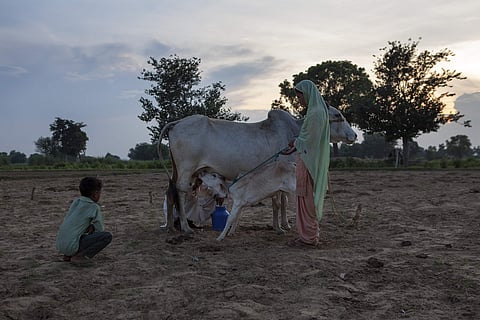

Eerie silences, lingering shots and uncomfortable close-ups dominate the documentary The Hour of Lynching, masterfully told by ace documentary makers Shirley Abraham and Amit Madheshiya. The duo, known for The Cinema Travellers (Official Selection at the 2016 Cannes Film Festival) and Searching for Saraswati (released via The New York Times), through their latest documentary, takes us through the gruesome tale of a Muslim dairy farmer Rakbar Khan, who in July 2018, was lynched in his village Kolgaon, Haryana under the allegations that he was taking cows to be slaughtered.
This independent documentary is one among the series of The Guardian Documentaries, was produced in partnership with Pulitzer Centre (non-profit news organisation) and saw support from Field of Vision, which has been set up by award-winning directors.
The documentary gives us all sides of the story as it is narrated by the family of Rakbar, the perpetrators and the villagers. Nonetheless, it is a disturbing account and the duo tells it like it is. Shirley points out their intention behind the documentary through the age-old adage, Art should comfort the disturbed and disturb the comfortable.
"Though we were judged and asked questions like, 'Do you know Hindi?' and 'You are not an awakened Hindu', there was no physical threat as such," he says and adds that they were well aware that the family of Rakbar Khan had found an ally in them and the perpetrators, though they remained skeptical, did not hold back in presenting their views to the point that it felt like a performance, which the makers were well aware of.
Talking about their observation documentary and close-ups, Shirley, who was born in Bhopal and is currently based out of Mumbai, talks about how restricting the crew to only herself and Amit and immersing themselves in the happening helped them build an intimacy, the result of which is the close-ups. "It was part of the grammar of filmmaking," adds the 37-year-old Amit.
A silent yet strong presence throughout the movie remains Sahila, Rakbar's daughter. Because his wife Asmeena must observe iddat (mourning in purdah), Sahila has no choice but to discontinue her studies and take care of the household. "She would not talk at all. Until she had to put away her books, her father's death was not really for her and it was upon her, the eldest of the children, that the responsibility of running the household upon," Shirley explains.
And though the film remains a compelling retelling of today's time with no fluff or silver lining, it is in Sahila that Shirley chose to see hope. "Because it is she who picks herself up and does what needs to be done," the 36-year-old explains.
